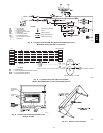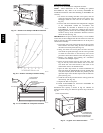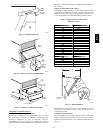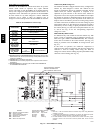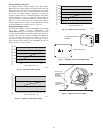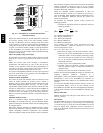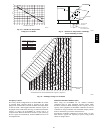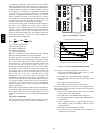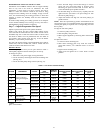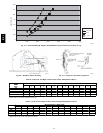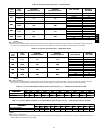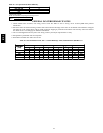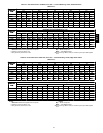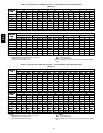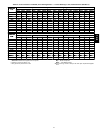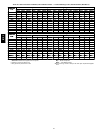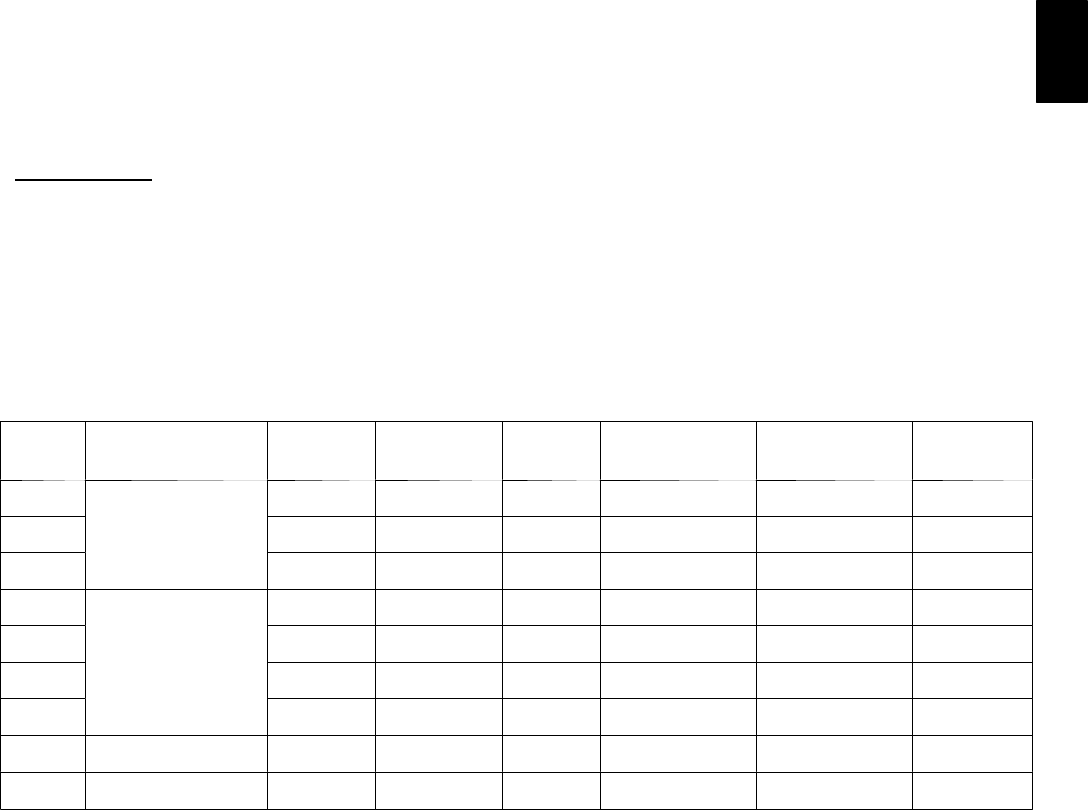
31
Dehumidification of Fresh Air with DCV Control
Information from ASHRAE indicates that the l argest humidity
load on any zone is the fresh air introduced. For some
applications, a device such as an ener gy recovery unit can be
added to reduce the moisture content of the fresh air being
brought into the building when the enthalpy is high. In most
cases, t he normal heating and cooling processes are m ore than
adequate to remove the humidity loads for most comme rcial
applications.
If normal rooftop heating and cooling operation is not adequate
for the outdoor humidity level, an energy recovery unit and/or a
dehumidification option should be considered.
Step 7 —Adjust Evaporator--Fan S peed
Adjust evaporator-fan speed to meet jobsite conditions.
Tables 8 and 9 show fan rpm at motor pulley settings for the
551C 024--060 and 551B 036--072 units. Tables 10 and 13 show
maximum amp draw of belt-drive motor. Table 12 shows sound
data. Refer to Tables 14-33 for performance data. See Table 34
for accessory static pressure drop. See Fig. 39 f or the Perfect
Humidity system static pressure drops .
For units with electric heating, required minimum cfm is 900 for
551B/C 036; 1200 for 551B/C 048; 1500 for 551B/C 060 and
1800 for 551B 072 and 600 for 551C 024.
Belt Drive
Motors
Fan motor pulleys are factory set for speed shown in Table 1.
Check pulley alignment and belt tension prior to start-up.
To change fan speed:
1. Shut off the unit power supply and tag disconnect.
2. Loosen the belt by loosening the fan motor mounting nuts.
(See Fig. 40.)
3. Loosen movable pulley flange setscrew (See Fig. 41).
4. Screw movable flange toward fixed flange to increase
speed and away from fixed flange to decrease speed.
Increasing fan speed increases load on motor. Do not
exceed maximum speed specified in Table 1.
5. Set movable flange at nearest keyway of pulley hub and
tighten setscrew. (See Table 1 for speed change for each
full turn of pulley flange.)
6. Adjust belt tension and align fan and motor pulleys per
guidance below.
NOTE: Onc e the required flange position is determined for the
correct blower rpm, it is recommended (but not required) that the
variable pitch pulley be replaced with a corres ponding size fixed
sheave pulley.
To align fan and motor pulleys:
1. Loosen fan pulley setscrews.
2. Slide fan pulley along fan shaft.
3. Make angular alignment by loosening motor from mount-
ing.
To adjust belt tension:
1. Loosen fan motor mounting nuts.
2. Slide motor mounting plate away from fan scroll for
proper belt tension (
1
/
2
-in.deflectionwith7to10lbof
force).
3. Tighten motor mounting nuts.
4. Adjust bolt and tighten nut to secure motor in fixed
position.
Table 7—CO
2
Sensor Standard Settings
SETTING EQUIPMENT OUTPUT
VENTILATION
RATE
(cfm/Person)
ANALOG
OUTPUT
CO
2
CONTROL RANGE
(ppm)
OPTIONAL
RELAY SETPOINT
(ppm)
RELAY
HYSTERESIS
(ppm)
1
Proportional Any
0-10V
4-20 mA
0-2000 1000 50
2
Interf ace w/Standard
Building Control System
Proportional Any
2-10V
7-20 mA
0-2000 1000 50
3
B
u
i
l
d
i
n
g
C
o
n
t
r
o
l
S
y
s
t
e
m
Exponential Any
0-10V
4-20 mA
0-2000 1100 50
4
Proportional 15
0-10V
4-20 mA
0-1100 1100 50
5
E
i
Proportional 20
0-10V
4-20 mA
0- 900 900 50
6
Economizer
Exponential 15
0-10V
4-20 mA
0-1100 1100 50
7
Exponential 20
0-10V
4-20 mA
0- 900 900 50
8
Health & Safety Proportional —
0-10V
4-20 mA
0-9999 5000 500
9
Parking/Air Intakes/
Loading Docks
Proportional —
0-10V
4-20 mA
0-2000 700 50
LEGEND
ppm — Parts Per Million
551B,C



